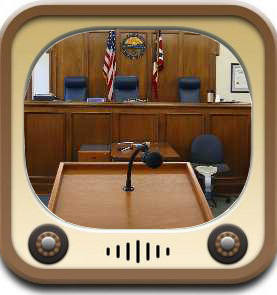 There are a couple of laws in California that the U.S. Supreme Court should consider before it announces tomorrow whether or not the Proposition 8 trial can be broadcast on YouTube: § 240 and § 422. These two laws don't address same-sex marriage, discrimination, or even access to courts, as you may have expected. Instead, these sections of the California Penal Code make it a crime to either assault or threaten to use violence against another person.
There are a couple of laws in California that the U.S. Supreme Court should consider before it announces tomorrow whether or not the Proposition 8 trial can be broadcast on YouTube: § 240 and § 422. These two laws don't address same-sex marriage, discrimination, or even access to courts, as you may have expected. Instead, these sections of the California Penal Code make it a crime to either assault or threaten to use violence against another person.
The Justices should take comfort in these laws. They are significant because the opportunity to view what could be a watershed case for gay rights is being prevented by a concern for the safety of witnesses. Ironically, those witnesses do not happen to be the persecuted homosexuals of bygone days, but instead those who now support a state measure to deny same-sex couples the right to marry. The trial began yesterday in San Francisco, and U.S. District Judge Vaughn Walker originally agreed to a delayed broadcast of each day's proceedings on YouTube. But yesterday the Supreme Court issued an order (.pdf) temporarily stopping the broadcast at the request of Prop 8's supporters.
"The record is already replete with evidence showing that any publicizing of support for Prop 8 has inevitably led to harassment, economic reprisal, threats, and even physical violence," according to the petitioner's application for a stay (.pdf). "In this atmosphere, witnesses are understandably quite distressed at the prospect of their testimony being broadcast worldwide on YouTube."
So, despite the Ninth Circuit Judicial Council's decision (.pdf) last month to allow cameras in district courtrooms on an experimental basis, this already highly publicized case may not be viewed by the public—well, most of the public as there are, in the Court's defense, a whopping 20 seats available. The rest of the world can either cram into other rooms of the courthouse to see real-time streaming of the trial or remain in the relative dark relying on text-only accounts.
Rather then spending time on the virtues of cameras in the courtroom, let me just say that my support for them is rooted in both a desire for transparency and the practical concern best worded by an old journalism professor of mine: What good is giving the press freedom if it is not allowed to use the tool of its trade? In this case, that tool is a video camera. Similarly, law enforcement has many tools of its trade, the most important being the law. In California, the law includes prohibiting the very acts Prop 8 supporters and—apparently—the Justices are so concerned about. Perhaps it's too much to ask, but can we just let both journalists and police do their jobs?
By staying the broadcast of this trial—and impliedly finding that Prop 8 supporters will suffer "irreparable harm" absent a stay—the Supreme Court seems to be advocating curtailment of the press as a means of law enforcement. In a sense, there's a backwards Heckler's Veto at play: the Court is protecting the right of witnesses to speak by limiting the ways in which they will be heard and preventing retaliation by those who will not have heard them. Instead, those witnesses should take the stand knowing they will be given the largest forum possible in which to speak and the strongest protection against those who may retaliate when they do so.
And that retaliation is a big may. Among their reasons for requesting a stay, the petitioners say that "public broadcast can intimidate witnesses who might refuse to testify or alter their stories when they do testify if they fear retribution by someone who may be watching the broadcast." Further, "all of the petitioners' witnesses have expressed concern over the potential public broadcast of trial proceedings and some have stated that they will refuse to testify if the district court goes forward with its plan."
In a controversial case such as this one, no doubt the unpopular speaker is a nervous one. But I'm skeptical that witnesses already committed to testifying will suddenly shy away because of the prospect of video dissemination. Do they not realize that, without a single camera, the San Jose Mercury News is reporting live accounts that include the names of those taking the stand? That special interest groups will be Twittering their testimony as they speak? That there are already websites identifying Prop 8 supporters and where they live? Banning a broadcast, I believe, will not change this. But to allow a broadcast, I'm certain, will further enlighten the debate over same-sex marriage, if not provide insight into our judicial system altogether.
But to help do that, the speaker, regardless of whether they are preaching in a town common or testifying in a trial, should be heard and, in this case, seen. When the petitioners argue that broadcasting the trial would "vastly increase the likelihood" that trial participants would face retaliation, the Supreme Court should acknowledge that this is an unfortunate price for press freedom, and the reason our police officers suit up each day.
Tomorrow is an opportunity for the Justices to do just that.
(Justin Silverman is a CMLP Legal Intern and a third-year evening student at Suffolk University Law School. Justin founded the Media and Communications Law Society and its SuffolkMediaLaw.com blog at Suffolk Law in 2009.)




